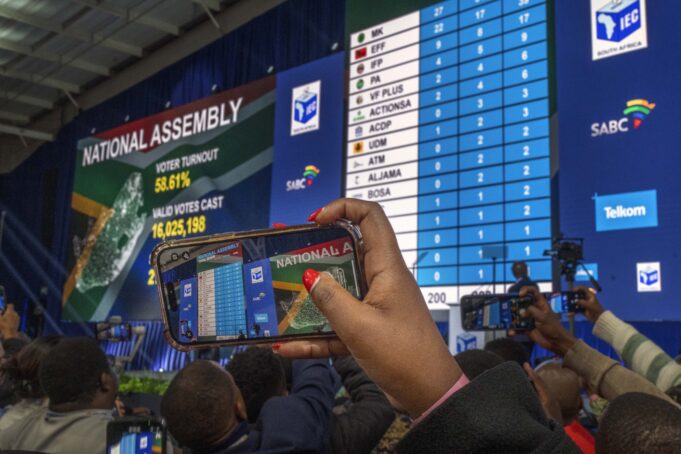The era of South Africa’s stand-alone African National Congress (ANC) hegemony may be over. And former president Jacob Zuma and his new party are making veiled threats if he’s not welcomed into what may be a future coalition government. South Africa’s recent election is seemingly ushering in a new political era.
The MK, or Umkhonto we Sizwe Party, the name given to the anti-apartheid military wing of the ANC, is headed by the 82-year-old Zuma. He still retains his ANC membership and came out of nowhere behind the Democratic Alliance (DA) by receiving an impressive 21.7 percent of the vote.

According to The Nation, in a speech delivered to supporters and journalists at the Electoral Commission of South Africa (IEC), the electoral count center, Zuma claimed, without evidence, that the election “was rigged.”
“He then demanded a rerun, because his expected ‘two-thirds majority’ (the proportion necessary to change the Constitution) had been stolen by the ANC and the DA on behalf of ‘White monopoly capital,’ which Zuma supporters and other radical nationalists blame for capturing the ANC and impoverishing the country’s Black majority,” reported thenation.com.
Adding to Zuma’s chagrin, ANC Secretary General Fikile Mbalula said after the late May election, that the ANC is open to all negotiations, which includes the main opposition DA Party, viewed as White and affluent.
A gigantic hurdle to get over is the DA’s “fierce opposition to the ANC’s efforts to create” what the BBC reported is “a welfare state—especially a government-funded national health service, which the DA rejects saying it is too expensive and threatens the future of the private health sector.”
“The DA believes in the free market, opposes a minimum wage, and wants to reduce red tape, saying this is the best way to improve the economy and raise living standards for all South Africans,” the public service broadcast company reported.
The DA received 21.80 percent of the vote, while former president Zuma’s newly formed MKP scored 17.4 percent. And since the ANC with 40.18 percent did not meet the 50 percent threshold required for an outright majority, it would need a coalition partner to govern, explained IOL News, a South African news website.
Lindiwe Sisulu had harsh words, slamming a possible ANC-DA coalition as “spitting on the graves of fallen struggle heroes.” She is an influential ANC heavyweight, daughter of Walter Sisulu and a National Executive Committee (NEC) member.
In a powerful public pronouncement, Lindiwe Sisulu called for a “Black Pact” alliance to counter the proposed coalition, which an ANC member told Africa Watch was being discussed between President Cyril Ramaphosa and the DA. Sisulu’s comments come amid the growing suspicion of a possible ANC-DA coalition following the ANC’s poor performance.
Instead of aligning with the DA, Sisulu—whose father, along with Nelson Mandela and Oliver Tambo were the ANC’s most influential members—proposed a coalition of Black-led parties, which she referred to as a “Black Pact.”
“This alliance would include the ANC, MK, EFF (Economic Freedom Fund), IFP (Inkatha Freedom Party), and PA (Patriotic Alliance), uniting under the common goals of Black liberation and economic emancipation,” IOL reported.
Speaking to South Africa’s The Star, Sisulu did not mince her words, describing the potential ANC-DA coalition as a “betrayal” of ANC supporters. She added, “A coalition will be a betrayal of those who strictly voted for the ANC.
ANC supporters voted for their beloved party and not the DA. If they were fans of the DA, they would have voted as such, and yet they have not,” said Sisulu. She argued that a partnership with the DA would hinder the healing process of the nation.
A media advisory distributed by the South African Communist Party (SACP) explained the consequences of siding with the interest of market finance over the interest of the Indigenous population and said it is against “seeking a coalition arrangement with the right-wing, DA-led anti-ANC neoliberal forces.”
“The core of the DA-led neoliberal forces, highly supported dominant sections of capital, mainly the White bourgeoisie whose roots can be traced to the era of colonial and apartheid oppression of the Black majority, organized itself into the so-called multiparty charter. This grouping also received support from Western foundations,” the media advisory stated.
Others have also cautioned against an ANC-DA coalition government.
Julius Malema is head of the Economic Freedom Fighters (EFF) party which won 9.5 percent of the vote. He warned the ANC against forming a coalition that “reinforces White supremacy” and being a “puppet of a White imperialist agenda.”
Economist Redge Nkosi is a former member of the Nelson Mandela and Thabo Mbeki administrations, and a member of the ANC. Nkosi told Africa Watch via WhatsApp that, “Those people who have departed the ANC haven’t gone anywhere.”
He explained that most of their votes went to parties like the EFF and MT, which broke from, and became different iterations of the ANC, that still believed in “Mandela and what he represented,” including “support for Palestine.”
Follow @JehronMuhammad on X, formerly Twitter













